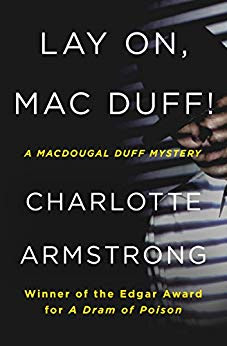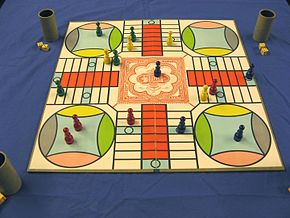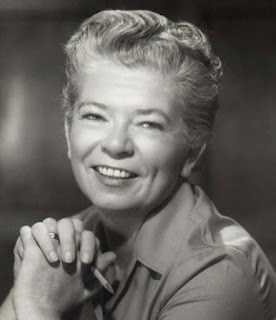McDougal
"Mac" Duff, ex-history professor-cum-brain for hire, is
"likely
to think poorly of people who say ‘Lay on, Mac Duff’ to him. He
says an intelligent person thinks of it, and realizes it’s been
said, and passes up the chance. But a dumbbell is so pleased with his
own cleverness, he always says it.” John
Joseph "JJ" Jones, newspaper
reporter-cum-Duff's
legman, conveys this advice to the young woman he's falling in love
with—Elizabeth "Bessie" Gibbon, who fears her ruthless
uncle, Charles Cathcart,
is
a murderer.
There
you have it, the setup for Charlotte Armstrong's first of many
novels, Lay
On, Mac Duff.
The plot's architecture seems simple and intriguing, with the
small cast of suspects diminishing in the first half when two of its members are
murdered. A takeoff on Christie's And
Then There Were None,
boiling down quickly until only
three plausible suspects remained. Then, in the second half, I found the solution needlessly complicated--such evidence as who arrived on a scene first and how did he or
she get there, and when was a
thermostat turned off and
how many minutes elapsed between phone calls or before this person
appeared or left or arrived or had the means to do this or that
surreptitiously and on and on and on. Unable to follow the intensely
meticulous conversations when the presumed good guys are hashing out
these seemingly trivial details, I found myself skipping entire
pages, wanting to get to something conclusive, especially
when
it became fairly obvious who'd been doing the murders. I
might have finally given up were it not for my hope Armstrong
would
spring a
surprise
villain a
la
Christie's favorite
device
of
unmasking someone we are led to believe all along is
someone else. The other option would be someone--Mac Duff presumably--solving the crimes by cerebral
procedural, i.e.
methodically sorting thru a mess of complicated threads
and details
and
notions.
Long
explanation short:
No
surprises in Lay
On, Mac Duff.
I
can't say I wasn't warned. Bitter
Tea & Mystery's Tracy
K, whose reviews of two later Armstrong novels
persuaded
me to give these novels a try, did mention the complicated plots.
Tracy
liked the writing and the characters, and so did I in the 1942
mystery that launched Armstrong's successful writing career (she won
a best-novel Edgar Award fifteen years later for A
Dram of Poison.)
Not inclined right now to read another of her
works, but if I get
the itch later
it will be because of the writing and the characters.
Lay
On, Mac Duff
is the first-person narrative of Bessie
Gibbon, 19,
who's just left her small upstate New York
hometown
where she was raised by her mother and Methodist minister father.
Both are dead, the mother most recently, and Bessie hopes to find a
job in New York City while staying with the wealthy uncle, whom
she's not met. Arriving by train in the evening, she finds Uncle
Charles and three business associates playing a cutthroat game of
Parcheesi.
The
uncle loses, something that rarely happens, and he is clearly
annoyed. That night, one of the players is shot to death in his home. As another more famous cerebral fictional detective loves
to say, the real game "is afoot."
First
to enter the presumed good guys' side is JJ Jones, a newspaper
reporter who immediately begins a heavy flirtation with Bessie when
he arrives at the house to interview anyone who might might have anything to say about the murder. Bessie is more than flattered by the attention, and, before I can think Jack be quick,
the two share a deep mutual infatuation. When it's clear Bessie
thinks it's likely her uncle committed the murder, persuading JJ to
share her suspicion, the intrepid reporter, who seems to have no
deadline for filing a story, suggests consulting his former history
professor, Mac Duff. After a second Parcheesi player is stabbed to
death in his home, Bessie's 25-year-old beautiful
aunt,
Lina, hires Duff to eliminate the uncle as a suspect. Now the game really is afoot. Lina
herself is a suspect, I should note, because Charles had "bought"
her after besting her father in a business deal. The old man is now
in a nursing home, and it's apparent to Bessie that Lina is not at
all happy in her marriage.
All
eyes are on Duff when he arrives and sets up shop at the Cathcart
mansion. He wears no deerstalker cap, nor smokes a pipe or anything
else. He doesn't apply Sherlockian ratiocination to learn volumes of information
from looking, say, at the label of jacket or the ring mark on a finger. He
just sits, asks an occasional question, and listens. Any legwork needing to be done JJ does voluntarily. Either he's been fired
offstage from his day job, or soon will be if he doesn't call the
city desk at least by book's end, or...uh oh, maybe isn't really a reporter
after all! But Bessie likes him, so we do too, because she is one
smart, albeit uneducated, cookie. Here, as an example of her
perspicacity, is her take on Mac Duff:
MacDougal Duff was waiting in
the drawing room, and pretty soon we went in there. He was a tall
leanish man with a long face and a long-lipped mouth and a long bony
hand that had warm life in it for all its gauntness...he
had a melancholy face, seamed and lined as if he had been through a
lot, and yet the lines were lightly etched as if for a long time some
peacefulness of spirit had been working to erase them. I couldn’t
tell how old he was, but like my uncle he knew too much to be young.
Pretty
perspicacious, I must admit. My goodness, she's smart enough and she's
articulate enough, knows enough big words...why, she could be a
novelist!! Here she is comparing Duff with her uncle:
The
great difference between him and my uncle was just what made them
seem most alike. That sounds crazy, but it was as if two extremes,
two opposites, were so far from each other that they met again around
at the back of the circle. Uncle Charles was tough, hard, armored
with experience. He was a seasoned fighter, a veteran disillusioned
and dangerous. Mac Duff had been through the wars, too, but for him
the battle was over. He was marked with wisdom but also with
weariness and some sadness. And there was this quietude about him,
this deep resignation, which was his power, so like my uncle’s and
so different...they were both powerful men. But I knew Mac Duff had
the only kind of strength against which my uncle’s strength would
have no purchase.
And
this (and no more, or you'll think I'm sweet on the guy, too): "He
had one of the sweetest smiles I’ve ever seen" she says, not
me! "It lightened his sad face so wonderfully, offered such a
shy affection, revealed behind the tired mask someone so eternally
young, so incorrigibly hopeful for the best in us, that I fell for
him then and there." One wonders if she shared this sentiment
with JJ. One hopes she's too smart to do this, but there are two
more books in the Mac Duff series, perhaps containing clues to this
potential trinity.
Presuming JJ's not the killer Mac Duff nails for the murders in this
debut outing.
One feature I especially liked
about Bessie's
Armstrong's narrative style is her close-up focus on the body language, the nuances of people she observes.
"Some people," she tells us, "have a way of walking
away from you with their consciousness of your still being there
somehow apparent in their spines, in the turn of their necks. But
when my uncle walked away you felt dropped and forgotten." I'd
never noticed something like that myself, but when I read this I knew
precisely what she meant.
And this. I don't know to whom
she refers, but it's typical of her predatory eye:
"He nodded,
still with that listening angle to his neck."
This:
"I could feel his bewilderment in the very limpness of his
fingers."
If Bessie's in the other two
books, she had better not still be looking for work. She should at least have won a literary award by then. Here's one last
quote, taken during one of Duff's sessions with the potential
murderers:
I saw Lina turn and scrutinize
Guy Maxon with a long deep look as if she’d read him inside and
out. I saw my uncle pretend not to watch Hugh and Hugh pretend not to
watch my uncle. I felt the criss-crossing of tensions weave and
tighten while Duff sat in the middle and soaked up his own
impressions of all the flying wordless messages. Hugh’s to me,
meaning, “I haven’t the right to ask you for faith in me, but
have you got it?” Maxon’s to Lina, meaning, “If I knew what you
were looking for, I’d be that thing. What is it?...What was [Duff]
thinking? What was he feeling? He wasn’t. Not for himself. But we
were feeling, and that was the point. The room was full of feelings
for all we sat so civilized and sipped our drinks. It was our
feelings that mattered, I remembered. And I knew what Duff was
watching and listening to.
And I do too heh heh heh heh
heh.



I kind of skimmed this review towards the end, not to get too much of the story, but based on what you say here, I think I am going to like this one as much as the other books by Armstrong. When I get to it. Even though I also get irritated with lots of discussions of details of timing, etc. I have the third and last McDougal Duff mystery to read some time too, and a few others to try.
ReplyDeleteI'm tempted to try another Duff. If only to see if Armstrong uses an ensemble cast, and if Bessie's still narrating.
Delete